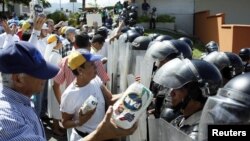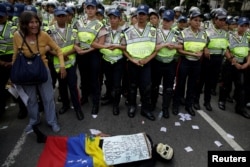Offering prized bags of flour to police and hurling empty medicine boxes on the floor, Venezuelan opposition protesters launched a new push on Monday to force President Nicolas Maduro from power and end 18 years of socialist rule.
Turnout for the opposition's first rallies of 2017 was not massive, reflecting disillusionment over last year's failure to bring about a referendum to recall the 54-year-old leader and successor to Hugo Chavez.
But those who did march in a string of rallies around the country turned creative in their complaints about the South American OPEC nation's unprecedented economic crisis.
Tear gas used
In the politically volatile western state of Tachira, long a hotbed of anti-Maduro sentiment, some demonstrators proffered flour — an increasingly scarce and expensive commodity during the nation's three-year recession — to police, witnesses said.
In Caracas, where several thousand opposition supporters marched, some threw empty medicine cartons on the floor to symbolize shortages afflicting the health sector.
Security forces fired tear gas in Tachira to stop protesters from reaching an office of the National Election Council, while in Caracas they used tear gas against people blocking a highway.
Prices soar for basics
With many of Venezuela's 30 million people skipping meals, unable to pay soaring prices for basic goods and facing long lines for scarce subsidized products, Maduro, who won a 2013 election to succeed Chavez, has become deeply unpopular.
Polls showed a majority of Venezuelans wanted a referendum last year which could have brought his rule to an early end and sparked a presidential vote. But compliant courts and election authorities thwarted the move, alleging fraud in signature collections.
“This government is scared of votes, and the election council is the instrument they use to avoid them," said housewife Zoraida Castro, 46, during a march to the election council's office in southern Ciudad Bolivar city.
Call for elections
The opposition Democratic Unity coalition is demanding dates for regional elections that are supposed to happen this year, and also urging Maduro to hold a new presidential ballot.
"It's a day of struggle in Venezuela," said coalition secretary general Jesus Torrealba, in Barquisimeto town to show solidarity with a Catholic archbishop whose residence was recently attacked after he criticized the government.
Maduro's six-year term is due to end in early 2019.
Red-shirted government supporters, who accuse the opposition of seeking a coup with U.S. connivance, were also marching on Monday, a politically significant day for Venezuelans: the anniversary of the 1958 fall of dictator Marcos Perez Jimenez.
They gathered at the National Pantheon building to honor leftist guerrilla Fabricio Ojeda, who was murdered in 1966.














